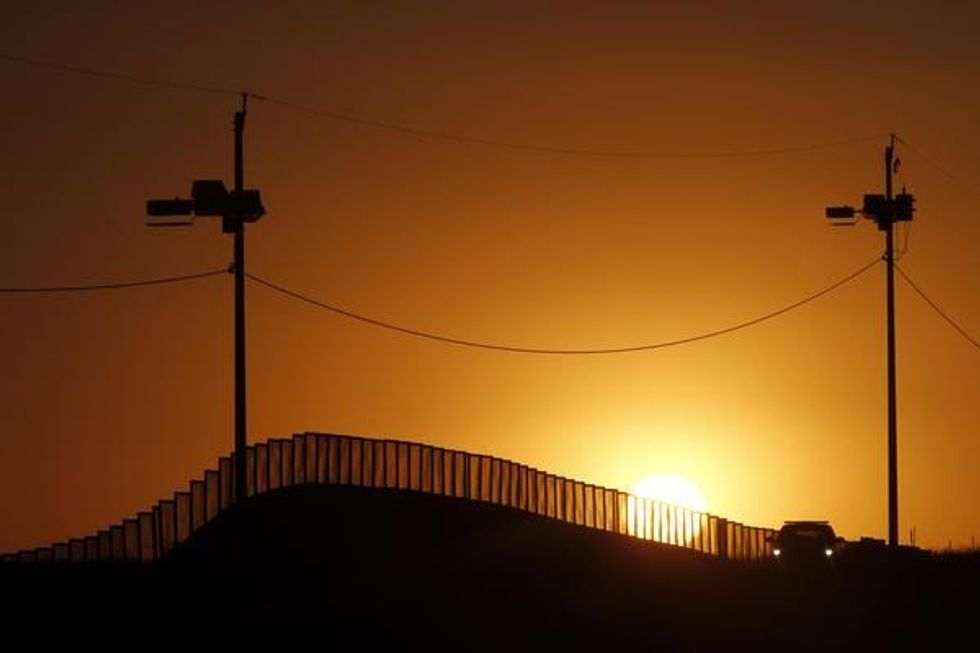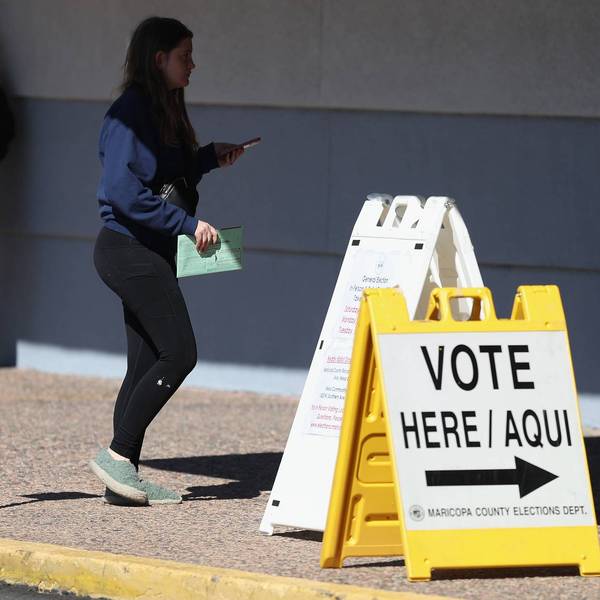Bipartisanship on the Border Equals Surge of Militarization, Surveillance
The Senate signaled bipartisan support for the heightened militarization of the US-Mexico border Monday, passing an immigration overhaul bill that, if implemented, will double border police to 40,000, fill the skies within 100 miles of the border with drones and helicopters, and erect a stunning 700 miles of new border walls.

The price tag of this military buildup? An estimated 46 billion dollars.
Colorlines reports concern among those who must live in the shadow of the escalated military presence:
"Border communities, and the DREAMers and families who live in the Southwest, have already been subjected to criminalization and militarization," Evelyn Rivera of the group United We Dream said in a statement. "This amendment is based on the false notion that our border is not secure or there hasn't been adequate enforcement up to this point."
Border militarization was thrown into the bill by republican senators as a condition of including a track to citizenship for 11 million undocumented people already living in the United States.
Yet, it ultimately passed with the muscle of Democrats, who threw their weight behind it with 67 votes and 27 from Republicans.
The bill makes small improvements to due process to immigrants incarcerated in U.S. criminal justice and immigration courts and slightly extends oversight of infamous Homeland Security jails. However, it will also require employers to cross-check potential hires with federal databases to check their citizenship status.
Furthermore, it will continue incarceration prosecutions for 'immigration offenses.' As the ACLU reports, today there are a stunning 100,000 immigration prosecutions a year as undocumented people are shuttled into overcrowded prisons with dismal human rights records.
While the bill is being touted by Democrats as a bipartisan compromise that allows a fast-track for citizenship, many immigrant justice groups argue the bill is so compromised by the border militarization amendment that it will ultimately hurt immigrant communities.
The New York Times reports:
A coalition of groups representing border communities urged senators to reject the amendment, which they called "an example of excessive and wasteful government spending" and a "poorly thought-out policy."
"It is an assault on our system of checks and balances and seriously threatens the quality of life of border residents," wrote the border groups, in a statement.
The ACLU issued a searing condemnation of the bill's end result:
Changes were made to the bill at the eleventh hour that meddled with what was already an unprecedented expansion of border enforcement in the base bill and increased it to obscene levels. These expenditures are wasteful, unnecessary and lack government oversight or accountability, and they put everyone who lives, travels, and works near the border at risk.
...The so-called surge will inevitably exacerbate civil liberties violations that the ACLU and other organizations have for years identified as characteristic of Customs and Border Protection operations, including excessive uses of force and racial profiling.
Immigrant advocates say the bill capitulates to the most far-right demands of Congress.
Colorlines reports:
"It makes little sense for Democrats to capitulate to irrational Republican demands, particularly at this stage in the legislative process," Chris Newman of the group National Day Laborers Network said in a statement, "Our focus should be on passing the best possible legislation in the Senate to maximize our ability to beat back the xenophobic and racist views that seem to have held the House of Representatives hostage."
Having passed through the Senate, the bill is next headed for the Republican-controlled House where it is expected to go nowhere due to GOP objections to the path to citizenship provisions.
_____________________
An Urgent Message From Our Co-Founder
Dear Common Dreams reader, The U.S. is on a fast track to authoritarianism like nothing I've ever seen. Meanwhile, corporate news outlets are utterly capitulating to Trump, twisting their coverage to avoid drawing his ire while lining up to stuff cash in his pockets. That's why I believe that Common Dreams is doing the best and most consequential reporting that we've ever done. Our small but mighty team is a progressive reporting powerhouse, covering the news every day that the corporate media never will. Our mission has always been simple: To inform. To inspire. And to ignite change for the common good. Now here's the key piece that I want all our readers to understand: None of this would be possible without your financial support. That's not just some fundraising cliche. It's the absolute and literal truth. We don't accept corporate advertising and never will. We don't have a paywall because we don't think people should be blocked from critical news based on their ability to pay. Everything we do is funded by the donations of readers like you. Will you donate now to help power the nonprofit, independent reporting of Common Dreams? Thank you for being a vital member of our community. Together, we can keep independent journalism alive when it’s needed most. - Craig Brown, Co-founder |

The price tag of this military buildup? An estimated 46 billion dollars.
Colorlines reports concern among those who must live in the shadow of the escalated military presence:
"Border communities, and the DREAMers and families who live in the Southwest, have already been subjected to criminalization and militarization," Evelyn Rivera of the group United We Dream said in a statement. "This amendment is based on the false notion that our border is not secure or there hasn't been adequate enforcement up to this point."
Border militarization was thrown into the bill by republican senators as a condition of including a track to citizenship for 11 million undocumented people already living in the United States.
Yet, it ultimately passed with the muscle of Democrats, who threw their weight behind it with 67 votes and 27 from Republicans.
The bill makes small improvements to due process to immigrants incarcerated in U.S. criminal justice and immigration courts and slightly extends oversight of infamous Homeland Security jails. However, it will also require employers to cross-check potential hires with federal databases to check their citizenship status.
Furthermore, it will continue incarceration prosecutions for 'immigration offenses.' As the ACLU reports, today there are a stunning 100,000 immigration prosecutions a year as undocumented people are shuttled into overcrowded prisons with dismal human rights records.
While the bill is being touted by Democrats as a bipartisan compromise that allows a fast-track for citizenship, many immigrant justice groups argue the bill is so compromised by the border militarization amendment that it will ultimately hurt immigrant communities.
The New York Times reports:
A coalition of groups representing border communities urged senators to reject the amendment, which they called "an example of excessive and wasteful government spending" and a "poorly thought-out policy."
"It is an assault on our system of checks and balances and seriously threatens the quality of life of border residents," wrote the border groups, in a statement.
The ACLU issued a searing condemnation of the bill's end result:
Changes were made to the bill at the eleventh hour that meddled with what was already an unprecedented expansion of border enforcement in the base bill and increased it to obscene levels. These expenditures are wasteful, unnecessary and lack government oversight or accountability, and they put everyone who lives, travels, and works near the border at risk.
...The so-called surge will inevitably exacerbate civil liberties violations that the ACLU and other organizations have for years identified as characteristic of Customs and Border Protection operations, including excessive uses of force and racial profiling.
Immigrant advocates say the bill capitulates to the most far-right demands of Congress.
Colorlines reports:
"It makes little sense for Democrats to capitulate to irrational Republican demands, particularly at this stage in the legislative process," Chris Newman of the group National Day Laborers Network said in a statement, "Our focus should be on passing the best possible legislation in the Senate to maximize our ability to beat back the xenophobic and racist views that seem to have held the House of Representatives hostage."
Having passed through the Senate, the bill is next headed for the Republican-controlled House where it is expected to go nowhere due to GOP objections to the path to citizenship provisions.
_____________________

The price tag of this military buildup? An estimated 46 billion dollars.
Colorlines reports concern among those who must live in the shadow of the escalated military presence:
"Border communities, and the DREAMers and families who live in the Southwest, have already been subjected to criminalization and militarization," Evelyn Rivera of the group United We Dream said in a statement. "This amendment is based on the false notion that our border is not secure or there hasn't been adequate enforcement up to this point."
Border militarization was thrown into the bill by republican senators as a condition of including a track to citizenship for 11 million undocumented people already living in the United States.
Yet, it ultimately passed with the muscle of Democrats, who threw their weight behind it with 67 votes and 27 from Republicans.
The bill makes small improvements to due process to immigrants incarcerated in U.S. criminal justice and immigration courts and slightly extends oversight of infamous Homeland Security jails. However, it will also require employers to cross-check potential hires with federal databases to check their citizenship status.
Furthermore, it will continue incarceration prosecutions for 'immigration offenses.' As the ACLU reports, today there are a stunning 100,000 immigration prosecutions a year as undocumented people are shuttled into overcrowded prisons with dismal human rights records.
While the bill is being touted by Democrats as a bipartisan compromise that allows a fast-track for citizenship, many immigrant justice groups argue the bill is so compromised by the border militarization amendment that it will ultimately hurt immigrant communities.
The New York Times reports:
A coalition of groups representing border communities urged senators to reject the amendment, which they called "an example of excessive and wasteful government spending" and a "poorly thought-out policy."
"It is an assault on our system of checks and balances and seriously threatens the quality of life of border residents," wrote the border groups, in a statement.
The ACLU issued a searing condemnation of the bill's end result:
Changes were made to the bill at the eleventh hour that meddled with what was already an unprecedented expansion of border enforcement in the base bill and increased it to obscene levels. These expenditures are wasteful, unnecessary and lack government oversight or accountability, and they put everyone who lives, travels, and works near the border at risk.
...The so-called surge will inevitably exacerbate civil liberties violations that the ACLU and other organizations have for years identified as characteristic of Customs and Border Protection operations, including excessive uses of force and racial profiling.
Immigrant advocates say the bill capitulates to the most far-right demands of Congress.
Colorlines reports:
"It makes little sense for Democrats to capitulate to irrational Republican demands, particularly at this stage in the legislative process," Chris Newman of the group National Day Laborers Network said in a statement, "Our focus should be on passing the best possible legislation in the Senate to maximize our ability to beat back the xenophobic and racist views that seem to have held the House of Representatives hostage."
Having passed through the Senate, the bill is next headed for the Republican-controlled House where it is expected to go nowhere due to GOP objections to the path to citizenship provisions.
_____________________

